Oct 28, 2025 10:47 AM
In Memoriam: Jack DeJohnette, 1942–2025
Jack DeJohnette, a bold and resourceful drummer and NEA Jazz Master who forged a unique vocabulary on the kit over his…
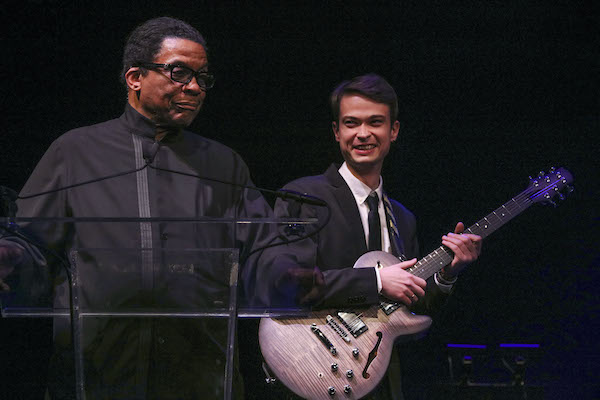
Herbie Hancock (left) and Evgeny Pobozhiy at the Herbie Hancock Institute of Jazz International Guitar Competition on Dec. 4 in Washington, D.C.
(Photo: Steve Mundinger)Evgeny Pobozhiy, a 30-year-old from Seversk, Russia, took first place at the Herbie Hancock Institute of Jazz International Guitar Competition on Dec. 3 in Washington, D.C.
The honor comes along with $30,000 in scholarship funding and a recording contract with Concord Records.
Of the three finalists competing at the Kennedy Center, Pobozhiy demonstrated the most expansive range in terms of sonic dexterity and emotional immediacy. Each performer played a pair of compositions alongside a rhythm section consisting of drummer Carl Allen, bassist Yasushi Nakamura and pianist Reggie Thomas. The three also had to play one song with alto saxophonist Bobby Watson added to the combo.
Pobozhiy rose to the challenge as he began his first song—an adventurous makeover of Jimmy Rowles’ “502 Blues (Drinkin’ And Drivin’),” which Wayne Shorter rendered on his 1966 LP, Adam’s Apple. The guitarist initiated the tune by stating the alluring melody unaccompanied before gliding across a midtempo waltz. He then unraveled the melodic material with a confident, well-paced improvisational zeal that included ear-grabbing textural manipulations. Toward the end, his passages gradually evolved into a howling testimonial that pushed toward the rock genre. It was a performance that immediately elicited rousing applause from the audience.
“He connected immediately in a way that you could feel his music,” said Pat Metheny, one of the competition’s judges. John Scofield, Lionel Loueke, Russell Malone, Lee Ritenour, Stanley Jordan and Chico Pinheiro also served on the panel. Metheny mentioned that all of the finalist played well, but what put Pobozhiy above his competitors were communicative skills with both the audience and band.
“It’s one thing to get onstage and play your behind off; that’s all well and good. But that’s not enough,” Malone added. “You have to communicate with the audience and the band. And [Pobozhiy] did both of those things. The judges also praised Pobozhiy for his deft interaction with the rhythm section and how he intertwined his passages with Watson on an enchanting reading of Steve Swallow’s “Falling Grace.”
The second-place winner—27-year-old Max Light, of Bethesda, Maryland—projected the best guitar sound of the three. He wielded a thick, cobalt tone, which he often let linger with single notes during his improvisations, especially on his glowing treatment of Duke Ellington’s “Prelude To A Kiss.” Before that, Light demonstrated rhythmic agility as his fluid lines wended through the harmonic lanes created by Watson and Thomas, and the shifting 6/8 to 4/4 momentum of Victor Lewis’ spry modern-bop composition, “Hey, It’s Me You’re Talking To.” His performances netted him $15,000 in scholarship funds.
Twenty-five-year-old Cecil Alexander, of Muskegon, Michigan—who won the third-place prize of $10,000 in scholarship funds—demonstrated the strongest affinity for the blues. Toward the end of his brisk rendition of Herbie Hancock’s “One Finger Snap,” he engaged Watson in some nifty banter as the rhythm section moved the pace from a blistering up-tempo to a mid-tempo shuffle. Unfortunately, Alexander’s sound got lost in the mix during the beginning of the tune. Once he emerged with a solo, though, his comely sound retained its presence. In addition to the blues, Alexander also showcased a love for deconstructing melodies into itty bits of fragmented notes. That came to the fore toward the beginning of his intriguing reading of Shorter’s “Infant Eyes.”
Given the nature of the electric guitar—and sometimes other accompanying gadgets—the competition’s risks were high, particularly if a performer was confronted with unexpected technical issues. Alexander alluded to some of those challenges during his soundcheck. “They were trying out my amp, and the power just wasn’t working; the speaker was busted,” he said. “They tried another amp and the same thing happened. But you just have to stay in the moment. I just hoped that the sound coming out would be the one I heard in my head.”
Before the announcement of the winner, the institute paid tribute to award-winning trumpeter, composer and film scorer Terence Blanchard, who was awarded the 2019 Maria Fisher Founder’s Award. Under the direction of pianist John Beasley, the tribute highlighted some cherished moments from Blanchard’s expansive discography. The gala’s core ensemble contained such noteworthy musicians as bassist Alan Hampton, trumpeter Billy Buss, pianist Victor Gould, singer Michael Mayo, drummer Colin Stranahan, and tenor saxophonists Walter Smith III and Dayna Stephens.
Gretchen Parlato’s soft yet piercing voice was electric on the moving rendering of the ballad “Ashe,” from Blanchard’s score of A Tale Of God’s Will (A Requiem For Katrina). Lizz Wright also gave a majestic performance during “Detour Ahead,” a song famously recorded by Billie Holiday, which Blanchard interpreted on his 1994 disc, The Billie Holiday Songbook. Cassandra Wilson, too, turned in a fine version of “On The Sunny Side Of The Street,” which she sang on Blanchard’s 2001 disc, Let’s Get Lost.
The Herbie Hancock Institute Ensemble also delivered a feisty reading of Blanchard’s “If I Could I Would,” a modern jazz piece characterized by a stubborn melody and a hard-boiled shuffle that the trumpeter taught students during his tenure as artistic director of the organization’s jazz performance college programs at the University of Southern California and Loyola University. After accepting the Fisher award, Blanchard led the ensemble through a blazing version of his edgy “Soldier.”
The gala also paid homage to late jazz and blues singer Joe Williams. With Emmy Award-winning actor and singer Keith David donning Williams’ signature attire (red blazer, white shirt and black trousers), his booming baritone led an ensemble through rip-roaring makeovers of “Every Day I Have The Blues” and “Alright, Okay, You Win.” Between those songs, he portrayed Williams, explaining his arrival to the music profession, as well as his time with Count Basie. DB
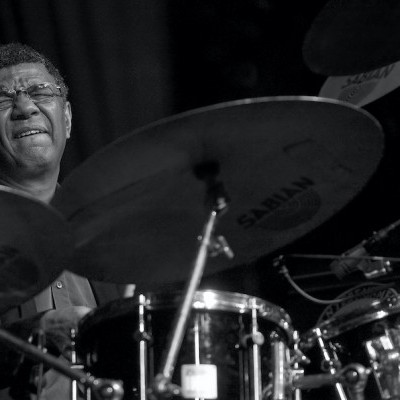
Jack DeJohnette boasted a musical resume that was as long as it was fearsome.
Oct 28, 2025 10:47 AM
Jack DeJohnette, a bold and resourceful drummer and NEA Jazz Master who forged a unique vocabulary on the kit over his…
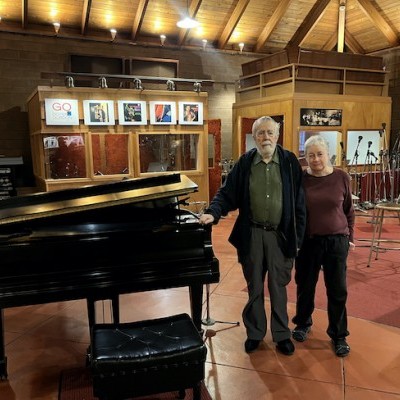
Don and Maureen Sickler serve as the keepers of engineer Rudy Van Gelder’s flame at Van Gelder Studio, perhaps the most famous recording studio in jazz history.
Sep 3, 2025 12:02 PM
On the last Sunday of 2024, in the control room of Van Gelder Studio, Don and Maureen Sickler, co-owners since Rudy Van…
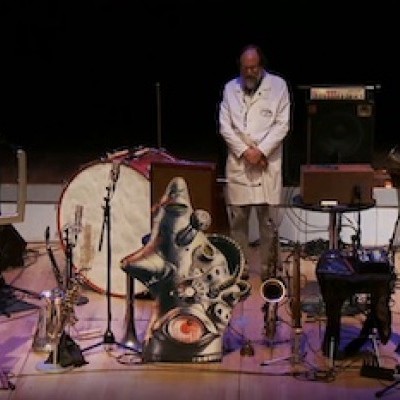
Trio aRT with its avalanche of instrumentation: from left, Pheeroan akLaff, Scott Robinson and Julian Thayer.
Sep 3, 2025 12:03 PM
Trio aRT, a working unit since 1988, shockingly released its very first studio recording this summer. Recorded in…
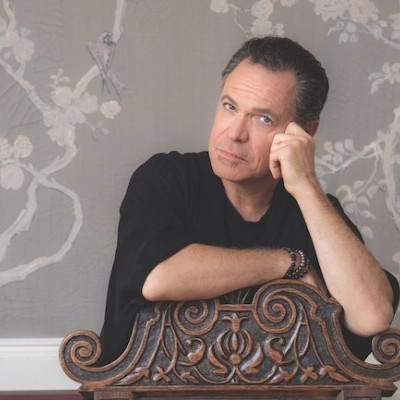
“Think of all the creative people I’m going to meet and a whole other way of thinking about music and a challenge of singing completely different material than I would have sung otherwise to my highest level in dedication to the moment,” Elling says about his Broadway run.
Sep 9, 2025 1:18 PM
Kurt Elling was back at home in Chicago, grabbing some family time in a late-June window between gigs. Sporting a smile…
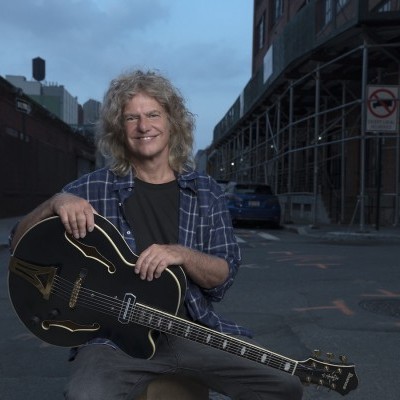
Pat Metheny will perform with his Side-Eye III ensemble at Big Ears 2026 in Knoxville, Tennessee, next March.
Sep 9, 2025 12:19 PM
Big Ears has announced the lineup for its 2026 festival, which will take place March 26–29 and include 250…